Coconut Oil
The Uses and Benefits of Coconut Oil
[ad] Empty ad slot (#1)!
Coconut oil has become a very popular product around the world. Its uses range from cooking and baking to beauty treatments and medicinal purposes. Coconut oil is extracted from the meat, or kernel of a coconut. All coconut oil is not the same, and all coconut oil is not harvested the same way. There is the wet method and the dry method of getting coconut oil. The wet method is the preferred way and makes for a more natural, virgin coconut oil. Coconut milk is produced from the coconut, and then the coconut oil is drawn from the coconut milk. Coconut oil can be called virgin, refined or organic. Virgin coconut oil is the result of this wet extraction. There is no standard for “virgin” or “extra virgin” in coconut oil as there is with olive oil. This pure process of making coconut oil makes it organic and virgin. Refined coconut oil is the product of getting coconut oil from copra, or the dry method. This oil is otherwise dirty and can not be safely digested, so it must be purified, or refined. The coconut oil that comes from copra is called RBD coconut oil. Refined, Bleached and Deodorized.
Cooking and baking with coconut oil or coconut butter can make your dishes the most mouth watering you have ever tasted them. Try cooking cubed sweet potatoes with coconut oil instead of olive oil and taste the difference. Pop some popcorn in coconut oil and you don’t even need to pour artery clogging butter on the popped corn afterwards. It will be fantastic just as it is, just like the movies. In fact that’s what most theaters pop their corn in! For baking, nothing will make your recipes taste better. Replace butters, margarines or shortenings with coconut oil or coconut butter and your cookies will melt in your mouth like never before.
The list of health benefits that can be achieved from coconut oil is staggering. Included in the coconut oil benefits are weight loss, hair care, skin care, stress relief, dental care, and bone strength. Coconut oil can also help maintain cholesterol levels, increase immunity, help with digestion and metabolism, and is said to aid in the relief of heart disease, diabetes, kidney problems, high blood pressure, HIV and even cancer.
Losing weight
Coconut oil and weight loss have been used synonymously for years. Even though coconut oil is high in fat content and calories, it is said to boost your metabolism and make you feel more full, so you eat less. It gives you extra energy and can also improve your thyroid function. Coconut oil’s fatty acid is actually a good one for the body, and your body will burn it for energy instead of storing the fat. Substituting coconut oil for regular vegetable cooking oils, or eating up to 3 tablespoons of pure coconut oil or coconut butter a day can result in positive benefits.
Beautiful Hair
Healthy hair can be achieved easily with coconut oil. Massaging your head with coconut oil on a regular basis will keep away dandruff, also lice and lice eggs. It conditions hair to keep it from getting damaged from daily abuse of hair dryers or hot irons. You can easily make your own hair care treatment with virgin coconut oil. Place some oil in a cup, and place a cup into a pot of warm water. You can add essential oils such as cedarwood or rosemary to the oil to help keep pesky dandruff away and to help your hair grow quicker. Add some geranium essential oil or lavender to help relieve stress and to replenish dry hair. Massage the warm coconut oil onto your scalp and cover hair with a cap or plastic wrap. Leave the oil on your hair for two hours if you generally have normal or oily hair, or overnight if you have extremely dry hair. Shampoo oil out of your hair, remembering that being that it is oil, you may have to shampoo more than once. There is no need to condition your hair, as the coconut oil did that for you. Coconut oil benefits your hair like no shampoo can.
Glowing Skin
Your skin can also benefit from coconut oil. It is an excellent skin moisturizer, and when applied to the face it can help reduce and clear up acne. You may notice your acne worsen for a time as the coconut oil draws all the oil out of your pimples and then dries them up. After time you will notice clearer, glowing skin. It can delay wrinkles and make your skin feel firmer, and keep your skin from dryness and flaking. Facial creams are mostly water based, which seep into the skin without much benefit. The coconut oil benefits will show on your face in no time. Coconut oil or coconut butter can also be used for tanning, and coconut butter is great to rub on a sunburn for relief.
Relief from Stress
Coconut oil can be a soothing way to calm down. Massage a little coconut oil on your head and not only will you feel relaxed but it can make your more alert and aware.
Other coconut oil benefits
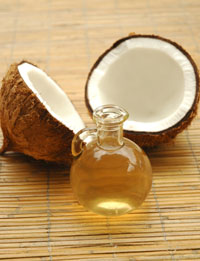 Coconut oil can prevent tooth decay by helping the body absorb calcium. This absorption of calcium also benefits your bones and can help keep osteoporosis away. Your immune system can be stronger thanks to the lauric acid found in coconut oil. Lauric acid is good for fighting viruses and bacteria, which can cause the flu, herpes and even HIV. Your digestive system will benefit from using coconut oil when cooking or baking. The oil can fight off the bacteria that can cause indigestion. It also helps the body to absorb vitamins and minerals better. Diabetes sufferers can reap the benefits of the oil as it makes the secretion of insulin work better, and helps control the blood sugar. It can help to dissolve kidney stones, and has even been said to reduce high blood pressure.
Coconut oil can prevent tooth decay by helping the body absorb calcium. This absorption of calcium also benefits your bones and can help keep osteoporosis away. Your immune system can be stronger thanks to the lauric acid found in coconut oil. Lauric acid is good for fighting viruses and bacteria, which can cause the flu, herpes and even HIV. Your digestive system will benefit from using coconut oil when cooking or baking. The oil can fight off the bacteria that can cause indigestion. It also helps the body to absorb vitamins and minerals better. Diabetes sufferers can reap the benefits of the oil as it makes the secretion of insulin work better, and helps control the blood sugar. It can help to dissolve kidney stones, and has even been said to reduce high blood pressure.
Coconut oil has even been used as an engine lubricant, an herbicide to get rid of weeds, and even a sexual lubricant. It is not only harmless, but has a pleasant taste as well.
Copra
When getting coconut oil through the dry process, the end result is called copra. The coconut oil is taken directly from the kernel of the coconut. The kernel is dried and compressed and the coconut oil is then removed. This is the less preferred way to get the coconut oil, as it is not as sanitary. There can be pieces of shell and kernel left in the oil, and the coconut oil can turn bad quickly due to the high moisture content. Copra is used as a food for cows and horses, as it’s high fat content is a good fattening tool for the animals.
More about copra…
Palm Oil, Palm Kernel Oil
Palm Oil is taken from the flesh or meat of the fruit, whereas Palm Kernel Oil is taken from the seed, or kernel of the fruit. The fatty acids in these 2 oils are very different. Palm Oil is 50% saturated fat and 50% unsaturated fat. Palm Kernel Oil is quite similar to coconut oil, and is 82% saturated fat, with about 18% unsaturated fat. Palm oil is used in almost half of the consumer goods on the market today. Breakfast cereals, soaps, detergents and hundreds of other products. Some say it is the cause of the rainforest destruction. greenhouse gas emissions, threatened extinctions of animals and other global problems.
More about palm oil and palm kernel oil…
Coconut oil is considered the elixir of life. It is an essential whole food that provides complete nutrition to nourish and sustain life. Coconut palms are considered vital to traditional communities throughout the Pacific as they provide small farmers with a product that is used to make oil, coconut butter and sugar. It helps people in tropical regions to increase their livelihoods and the money allows them to maintain their communities, the growth and harvesting of the palm tree is essential. The production of coconut oil and coconut sugar produces the highest income for these farmers and the products benefit communities around the world.
So there you have it. Coconut oil, coconut butter, coconut water and juice and coconut sugar. Many ways for you to enjoy the same wonderful fruit and to reap the coconut oil benefits with each delicious taste.
Coconut Oil and the Tree of Life
Coconut Oil: The Facts Are In
You’ve no doubt been told your entire life that saturated fats are bad for you. They lead to cardiovascular disease, obesity, and high cholesterol. This is common knowledge. However, few people are aware that there is more than one type of saturated fat. Most saturated fats are also known as “trans-fats.” They are artificially created through a process known as hydrogenation.
Through the process of hydrogenation, vegetable oils are heated and hydrogen atoms are added to the mix. This produces a thick substance which extends the shelf-life of processed foods. It isn’t beneficial to your health in any way.
Some saturated fats are not created by man and instead occur naturally. An example of this is coconut oil. Coconuts are the fruit of the coconut palm tree, or Cocos Nucifera. The coconut palm is monotypic, which means that every coconut palm in the world is the same species. It may very well be the single most abundant fruit-bearing tree in existence. The coconut palm is known as “kalpa vrishka” in Sanskrit. This is translated as the “Tree of Life.”
An interesting fact is that studies done on Pacific Islanders, who’s diet consists of anywhere from 30 to 60 percent saturated coconut oil, find that cardiovascular disease is almost non-existent! It would seem that coconut oil isn’t harmful to human health. In fact, on average, wherever coconut oil is a staple of the local diet you’ll find low rates of heart disease and obesity.
Coconut oil is extracted from the dried sections of the meat of the coconut, also known as copra. The oil’s benefits are numerous. It is a rich source of vitamin E, vitamin K, iron, and other minerals. It promotes a healthy heart, increases your metabolism, supports a healthy immune system, boosts your thyroid, and it even aids in weight loss. When applied directly to the skin, it has been known to have anti-aging effects.
So what’s the secret? Half of the fat found in coconut oil is lauric acid, which is rarely found in nature. The body converts lauric acid into monolaurin. Monolaurin is known for it’s anti-bacterial and anti-viral properties. Most vegetable oils contain long chain fatty acids, or long chain triglycerides. Your body has a difficult time breaking these long chains down, so they are typically stored away as fat.
Coconut oil is a source of medium chain fatty acids. They are smaller and much easier for the body to digest. Similar to carbohydrates, they are immediately converted to energy. These medium chain fatty acids actually help your body burn fat and boost your metabolism. In other words, coconut oil will help you lose weight. Carbohydrates provide a similar boost of energy at the cost of an insulin spike. Coconut oil has no such properties and will actually lower your risk of type 2 diabetes.
Recent studies indicate that coconut oil may be beneficial in AIDs patients as well. HIV patients that exhibited particular symptoms were placed on one of two nutritional supplements for a period of 12 days. One group consisted of long-chain triglycerides, and the other medium-chain triglycerides. While both groups showed marked improvement, the group that received the medium-chain treatment demonstrated a significant improvement over the baseline.
Coconut oil has many industrial uses as well. It is used in the manufacture of soaps, shampoos, and detergents. The lauric acid it contains is essential to these detergents and creates a lathering effect. It is used to create synthetic rubber, and is an environmentally friendly alternative to petroleum products. The oil is used in edible fats such as vegetable shortening and margarine. Refined coconut oil is used as a preservative in baked goods.
A common misconception is that palm oil, palm kernel oil, and coconut oil are all the same. Palm oil is produced from the fruit of the oil palm, not the coconut palm. Like it’s cousin, coconut oil, palm oil contains natural saturated fats and is known for it’s anti-microbial effects. However, coconut and palm kernel oils are more highly saturated than palm oil. Regardless, palm oil is widely used and is rich in beta-carotene, the same nutrient found in carrots. This is what gives palm oil it’s dark red color.
Palm kernel oil is derived from the kernel of the oil palm rather than fruit pulp. It is a cheaper alternative and is widely used in cooking. However, many feel that palm oil production is harmful to the environment and contributes to deforestation. Coconuts, on the other hand, are an extremely renewable resource and typically people prefer the taste of coconut oil over palm oils.
In Conclusion
[ad] Empty ad slot (#1)!
After examining the multitude of health benefits, it becomes clear why the coconut palm is referred to as the Tree of Life. The idea that one of the most abundant trees on the planet also happens to be one of the healthiest and most useful is absolutely amazing. What isn’t clear, is how on earth we’ve come this far in our society without recognizing these benefits ages ago.
Coconut oil may very well be the answer to the obesity crisis in America. Every day more and more heart attacks, strokes, and other related illnesses are reported. Fast food restaurants are now on every corner. The invention of television and video games keeps us in our homes rather than outside getting the exercise we need.
Will Westerners turn away from the TV set, abstain from fatty foods, shut down the computer, and focus on an active, healthy life? Probably not. We can, however, take steps to ensure that the damage inflicted by these “innovations” is minimal. Coconut oil may be the solution we’ve been looking for.
Coconut products are relatively new to the western market. The recent health kick in America and the wave of health products that has followed is the main reason why the coconut industry has grown so much in the last few years. As public knowledge grows, so too will public health.
Recommended websites about oils: Provides information on almond oil, it’s health benefits, types, uses and other almond products such as almond milk, almond paste, butter and more. Canola oil, or rapeseed oil – Canadian Oil Low Acid, description, uses, health benefits and dangers. Macadamia Oil – many uses of macadamia nut oil in cosmetics and food, Safflower oil and Sunflower oil – healthy oils for cooking.
The Uses and Benefits of Coconut Oil | Other coconut oil benefits | Copra | Palm Oil, Palm Kernel Oil | Coconut Oil and the Tree of Life | Coconut Oil: The Facts Are In | In Conclusion

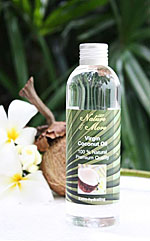 Coconut Oil
Coconut Oil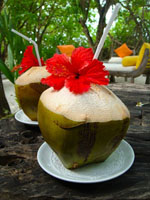 Coconut Juice
Coconut Juice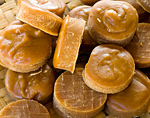 Coconut Sugar
Coconut Sugar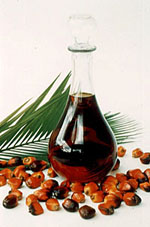 Palm Kernel Oil
Palm Kernel Oil Copra
Copra